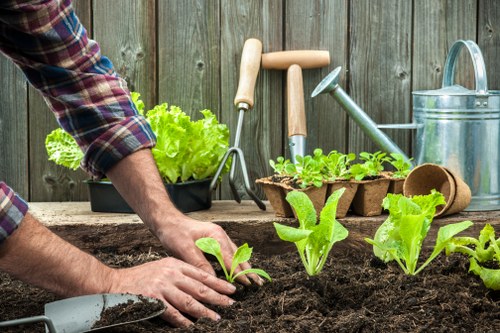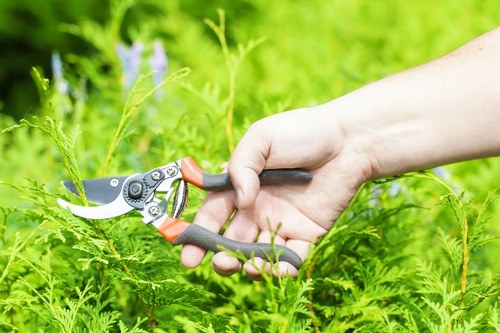Effective Oil Stain Removal for Driveways in Purley

Introduction to Oil Stains on Driveways
Oil stains on driveways are a common issue faced by homeowners in Purley. These unsightly marks not only affect the appearance of your property but can also lead to more significant problems if not addressed promptly.
Understanding the causes and effective removal methods is essential to maintaining a clean and attractive driveway.
In this article, we will explore various techniques and tips to help you successfully eliminate oil stains from your driveway, ensuring it remains spotless and well-maintained.

Common Causes of Oil Stains
Oil stains can originate from several sources, including:
- Vehicle leaks or spills
- Improper disposal of motor oil
- Accidental drips from machinery or tools
- Salt and oil mixtures used for de-icing
Identifying the source of the stain is crucial for selecting the most effective removal method.
Different oils and surfaces may require specialized treatments to ensure complete removal.

Preparation Before Stain Removal
Before attempting to remove oil stains, it's important to prepare the area properly:
- Clear the driveway: Remove any vehicles, furniture, or debris from the stained area.
- Assess the stain: Determine the size, age, and type of oil causing the stain.
- Gather necessary materials: Common supplies include baking soda, cat litter, degreasers, and pressure washers.
Proper preparation ensures that the removal process is efficient and effective.
Taking these steps can save time and prevent further staining.

Top Oil Stain Removal Methods
There are several methods to remove oil stains from driveways, each with its own advantages:
- Baking Soda and Dish Soap: A natural and eco-friendly option that works well for fresh stains.
- Cat Litter: Absorbs excess oil, making it easier to remove the stain.
- Commercial Degreasers: Highly effective for stubborn stains but may require multiple applications.
- Pressure Washing: Uses high-pressure water to blast away oil residues.
Selecting the right method depends on the severity of the stain and the type of driveway surface.
Combining methods can often yield the best results.

Preventing Future Oil Stains
Preventing oil stains is as important as removing them. Here are some tips to keep your driveway clean:
- Regularly inspect and maintain vehicles to prevent leaks.
- Use drip pans under machinery and equipment.
- Immediately clean up any spills to prevent seepage.
- Consider installing oil drip trays or mats.
Proactive measures can significantly reduce the occurrence of oil stains.
Maintaining a clean driveway enhances the overall curb appeal of your home.

Choosing the Right Cleaning Agents
Selecting appropriate cleaning agents is vital for effective oil stain removal:
- Environmentally Friendly Cleaners: Safe for pets and plants, ideal for eco-conscious homeowners.
- Heavy-Duty Degreasers: Best for deep and old stains, offering powerful cleaning action.
- Homemade Solutions: Cost-effective and versatile, suitable for minor stains.
Always follow the manufacturer's instructions when using commercial products.
Testing a small area first can prevent potential damage to the driveway surface.

Step-by-Step Oil Stain Removal
Follow these steps to effectively remove oil stains from your driveway:
- Absorb Excess Oil: Sprinkle baking soda or cat litter over the stain and let it sit for 15 minutes.
- Sweep the Area: Remove the absorbent material using a broom or shovel.
- Apply Cleaning Agent: Use a degreaser or a homemade mixture of dish soap and warm water.
- Scrub the Stain: Use a stiff brush to work the cleaner into the stain.
- Rinse and Repeat: Wash the area with water and repeat the process if necessary.
- Dry the Driveway: Allow the driveway to dry completely, ensuring no residue remains.
Consistency and patience are key to completely removing oil stains.
Regular maintenance can prevent the need for extensive cleaning efforts.

Special Considerations for Different Driveway Materials
Different driveway materials require specific cleaning approaches:
- Asphalt Driveways: Use gentle cleaners to avoid damaging the surface.
- Concrete Driveways: Can withstand stronger degreasers and pressure washing.
- Gravel Driveways: Absorbent materials like cat litter are particularly effective.
- Block Pavers: Ensure thorough rinsing to prevent residue buildup between blocks.
Understanding your driveway material helps in selecting the most appropriate removal method.
Tailoring your approach ensures long-lasting cleanliness and preservation of the driveway.

Hiring Professional Services in Purley
For stubborn or extensive oil stains, professional cleaning services may be the best option:
- Expertise: Professionals have the knowledge and tools to handle various stain types.
- Efficiency: Faster and more effective removal compared to DIY methods.
- Long-Term Solutions: Professionals can offer advice on preventing future stains.
When selecting a service, consider their experience, reviews, and pricing.
Investing in professional help can save time and ensure optimal results.

Local Availability of Cleaning Supplies
Access to quality cleaning supplies is essential for effective oil stain removal. In Purley, you can find:
- Local hardware stores offering a range of degreasers and cleaning agents.
- Home improvement centers with tools like pressure washers and scrubbing brushes.
- Specialized cleaning supply shops catering to specific needs.
Purchasing locally supports the community and ensures you receive personalized assistance.
Properly sourced supplies contribute to the success of your cleaning efforts.

Environmental Considerations
When removing oil stains, it's important to consider the environmental impact:
- Use eco-friendly cleaning products to minimize harm to plants and wildlife.
- Properly dispose of oil-soaked materials to prevent soil contamination.
- Avoid harsh chemicals that can degrade the driveway and surrounding areas.
Caring for the environment ensures sustainable maintenance practices.
Responsible cleaning methods protect both your property and the local ecosystem.

Maintaining Your Driveway Post-Cleaning
After removing oil stains, maintaining your driveway helps prevent future issues:
- Regularly sweep to remove debris and prevent staining agents from accumulating.
- Seal asphalt or concrete surfaces to provide a protective barrier against spills.
- Promptly clean any new stains to avoid persistent marks.
Consistent maintenance extends the lifespan of your driveway.
Investing time in upkeep ensures your driveway remains visually appealing and functional.

Cost-Effective Solutions for Oil Stain Removal
Removing oil stains doesn't have to break the bank. Here are some budget-friendly options:
- DIY Cleaning: Using household items like baking soda and dish soap.
- Homemade Degreasers: Mixing vinegar and water for effective cleaning.
- Preventative Measures: Simple steps to reduce the likelihood of future stains.
Cost-effective methods provide satisfactory results without high expenses.
Balancing cost and effectiveness ensures practical solutions for homeowners.

Seasonal Considerations for Cleaning
Different seasons present unique challenges for oil stain removal:
- Winter: Salt and oil mixtures require timely cleaning to prevent surface damage.
- Summer: Heat can cause oil to set, making stains harder to remove.
- Spring: Post-winter cleanup can address accumulated stains.
Adjusting your cleaning approach based on the season enhances effectiveness.
Being proactive during specific times of the year can simplify maintenance efforts.

Innovative Tools for Stain Removal
Utilizing the right tools can significantly improve oil stain removal:
- Pressure Washers: Provide high-powered cleaning for stubborn stains.
- Steam Cleaners: Use heat to break down oil residues.
- Scrubbing Brushes: Help in manually removing embedded stains.
Investing in quality tools ensures efficient and effective cleaning processes.
Proper tool use can make the task less labor-intensive and more successful.

Local Regulations and Guidelines
When dealing with oil stains, it's important to be aware of local regulations in Purley:
- Proper disposal of oil and contaminated materials.
- Restrictions on certain cleaning agents to protect the environment.
- Permits for using heavy equipment like pressure washers.
Adhering to local guidelines ensures compliance and environmental protection.
Staying informed helps avoid potential fines and contributes to community well-being.

Conclusion
Oil stain removal on driveways in Purley requires a combination of the right methods, tools, and preventive measures.
By understanding the causes and applying effective solutions, homeowners can maintain a clean and appealing driveway.
Whether opting for DIY methods or hiring professionals, taking prompt action ensures long-lasting results.
Frequently Asked Questions
1. What is the best method for removing fresh oil stains?
The best method for fresh oil stains is to immediately absorb the excess oil with materials like baking soda or cat litter, then apply a mixture of dish soap and warm water to scrub the area.
2. Can I use a pressure washer on all types of driveways?
While pressure washers are effective, they should be used cautiously on delicate surfaces like asphalt to prevent damage. Concrete and block pavers generally withstand pressure washing better.
3. How can I prevent oil stains from recurring on my driveway?
Regular vehicle maintenance to prevent leaks, using drip trays, promptly cleaning spills, and sealing your driveway can help prevent oil stains from recurring.
4. Are eco-friendly cleaners as effective as commercial degreasers?
Eco-friendly cleaners can be effective for light to moderate stains and are safer for the environment, though stubborn stains may require stronger commercial degreasers.
5. When should I consider hiring a professional for oil stain removal?
If the oil stains are extensive, old, or persistent despite your efforts, hiring a professional can ensure thorough removal and prevent potential driveway damage.


